最新人教版英语八年级下册教案(全册)
八下全册英语电子教案人教版
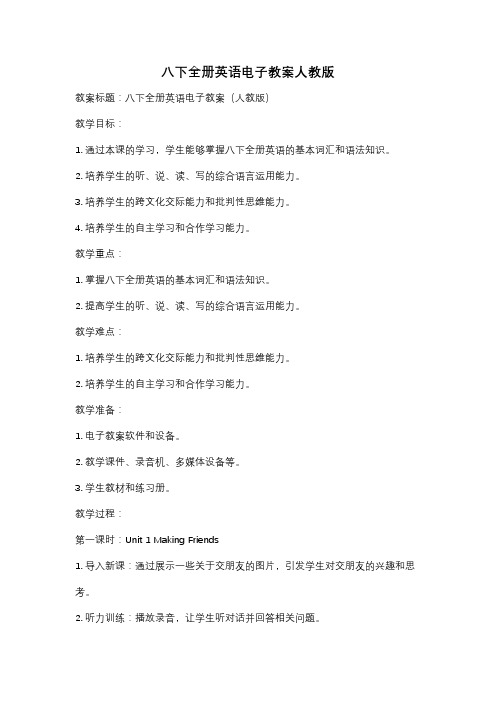
八下全册英语电子教案人教版教案标题:八下全册英语电子教案(人教版)教学目标:1. 通过本课的学习,学生能够掌握八下全册英语的基本词汇和语法知识。
2. 培养学生的听、说、读、写的综合语言运用能力。
3. 培养学生的跨文化交际能力和批判性思维能力。
4. 培养学生的自主学习和合作学习能力。
教学重点:1. 掌握八下全册英语的基本词汇和语法知识。
2. 提高学生的听、说、读、写的综合语言运用能力。
教学难点:1. 培养学生的跨文化交际能力和批判性思维能力。
2. 培养学生的自主学习和合作学习能力。
教学准备:1. 电子教案软件和设备。
2. 教学课件、录音机、多媒体设备等。
3. 学生教材和练习册。
教学过程:第一课时:Unit 1 Making Friends1. 导入新课:通过展示一些关于交朋友的图片,引发学生对交朋友的兴趣和思考。
2. 听力训练:播放录音,让学生听对话并回答相关问题。
3. 语言点讲解:介绍本单元的重点词汇和语法知识,如常见的交际用语、形容词的比较级和最高级等。
4. 听力训练:再次播放录音,让学生进行听力练习,并完成相关练习题。
5. 阅读训练:学生阅读课文并回答问题,加深对课文内容的理解。
6. 语言运用:学生进行口语练习,模仿课文中的对话,练习使用新学的交际用语。
7. 作业布置:要求学生完成课后练习册中的相关练习题。
第二课时:Unit 2 Growing Pains1. 复习导入:通过回顾上节课的内容,帮助学生温习所学的词汇和语法知识。
2. 听力训练:播放录音,让学生听对话并回答相关问题。
3. 语言点讲解:介绍本单元的重点词汇和语法知识,如情态动词的用法、情感形容词等。
4. 听力训练:再次播放录音,让学生进行听力练习,并完成相关练习题。
5. 阅读训练:学生阅读课文并回答问题,加深对课文内容的理解。
6. 语言运用:学生进行口语练习,模仿课文中的对话,练习使用新学的语言点。
7. 作业布置:要求学生完成课后练习册中的相关练习题。
八年级英语下册全册教案人教版新目标收集
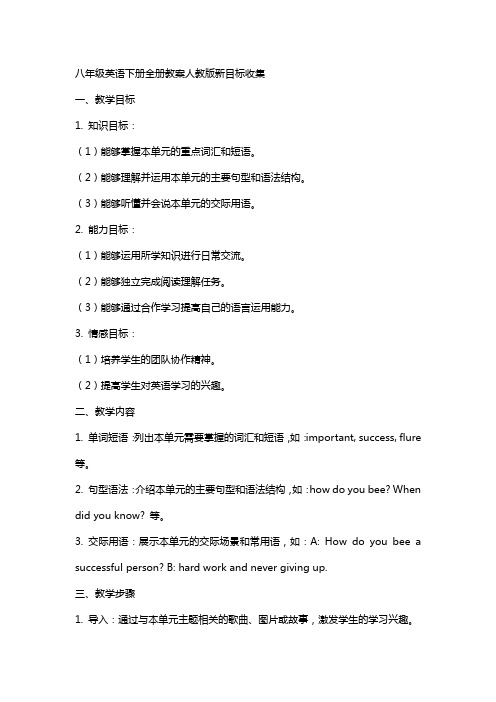
八年级英语下册全册教案人教版新目标收集一、教学目标1. 知识目标:(1)能够掌握本单元的重点词汇和短语。
(2)能够理解并运用本单元的主要句型和语法结构。
(3)能够听懂并会说本单元的交际用语。
2. 能力目标:(1)能够运用所学知识进行日常交流。
(2)能够独立完成阅读理解任务。
(3)能够通过合作学习提高自己的语言运用能力。
3. 情感目标:(1)培养学生的团队协作精神。
(2)提高学生对英语学习的兴趣。
二、教学内容1. 单词短语:列出本单元需要掌握的词汇和短语,如:important, success, flure 等。
2. 句型语法:介绍本单元的主要句型和语法结构,如:how do you bee? When did you know? 等。
3. 交际用语:展示本单元的交际场景和常用语,如:A: How do you bee a successful person? B: hard work and never giving up.三、教学步骤1. 导入:通过与本单元主题相关的歌曲、图片或故事,激发学生的学习兴趣。
2. 呈现:介绍本单元的主要词汇、短语、句型和语法结构。
3. 练习:通过听力、口语、阅读和写作等多种形式,让学生充分练习本单元的知识点。
4. 应用:设计真实的交际场景,让学生运用本单元的知识进行实际交流。
四、教学评价1. 课堂参与度:观察学生在课堂上的积极参与情况和合作程度。
2. 作业完成情况:检查学生课后作业的完成质量和速度。
3. 测验成绩:定期进行单元测验,评估学生的学习效果。
五、课后作业1. 抄写本单元的词汇和短语。
2. 造句运用本单元的句型和语法结构。
3. 编写一段对话或短文,运用本单元的交际用语。
4. 预习下一单元的内容。
六、教学资源1. 教材:八年级英语下册人教版新目标。
2. 辅助材料:多媒体课件、听力材料、练习题、单词卡片等。
3. 网络资源:相关视频、音频、文章等。
七、教学方法1. 任务型教学法:通过完成各种真实的任务,提高学生的语言运用能力。
人教版八年级下册英语教案全册
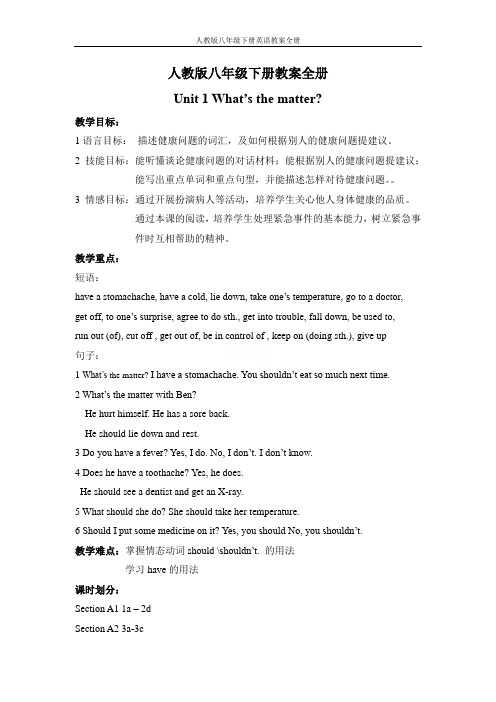
人教版八年级下册教案全册Unit 1 What’s the matter?教学目标:1语言目标:描述健康问题的词汇,及如何根据别人的健康问题提建议。
2 技能目标:能听懂谈论健康问题的对话材料;能根据别人的健康问题提建议;能写出重点单词和重点句型,并能描述怎样对待健康问题。
3 情感目标:通过开展扮演病人等活动,培养学生关心他人身体健康的品质。
通过本课的阅读,培养学生处理紧急事件的基本能力,树立紧急事件时互相帮助的精神。
教学重点:短语:have a stomach ache, have a cold, lie down, take one’s temperature, go to a doctor,get off, to one’s surprise, agree to do sth., get into trouble, fall down, be used to,run out (of), cut off , get out of, be in control of , keep on (doing sth.), give up句子:1 What’s the matter? I have a stomachache. You shouldn’t eat so much next time.2 What’s the matter with Ben?He hurt himself. He has a sore back.He should lie down and rest.3 Do you have a fever? Yes, I do. No, I don’t.I don’t know.4 Does he have a toothache? Yes, he does.He should see a dentist and get an X-ray.5 What should she do? She should take her temperature.6 Should I put some medicine on it? Yes, you should No, you shouldn’t.教学难点:掌握情态动词should \shouldn’t. 的用法学习have的用法课时划分:Section A1 1a – 2dSection A2 3a-3cSection A3 Grammar focus-4cSection B1 1a-2eSection B2 3a-Self checkSection A 1 (1a – 2d)Step 1 Warming up and new words1. Look at a picture and learn the parts of the body.2. New words and phrases.Step 2 Presentation1a Look at the picture. Write the correct letter [a-m] for each part of the body.___arm ___ back ___ ear ___ eye ___ foot ___hand ___ head ___ leg ___ mouth___ neck ___nose ___ stomach ___ toothKeys: h e g i h a j l c d m k fStep 3 Listening1b Listen and look at the picture. Then number the names 1-5Listen to the conversations again and fill in the blanks.Conversation 1Nurse: What’s the matter, Sarah?Girl: I ___________.Conversation 2Nurse: What’s the matter, David?Boy: I _________________.Conversation 3Nurse: What’s the matter, Ben?Boy: I _________________.Conversation 4Nurse: What’s t he matter, Nancy?Girl: I _________________.Conversation 5Betty: What’s the matter, Judy?Ann: She __________________.Keys: have a coldgot a stomachachehave a sore backhave a toothachehas a sore throatStep 4 Speaking1c Look at the pictures. Wha t are the students’ problems? Make conversations.ExamplesA: What’s the matter with Judy?B: She talked too much yesterday and didn’t drink enough water.She has a very sore throat now.A: What’s the matter with Sarah?B: She didn’t take care of herself on the weekend. She was playing with her friends at the park yesterday. Then it got windy, but she didn’t put on her jacket.Now she has a cold.Step 5 Guessing gamesGuess what has happened to the students by using the important sentences.Step 6 Listening2a Listen and number the pictures [1-5] in the order you hear them.Keys: 2 4 3 1 52b Listen again. Match the problems with the advice.1 fever a lie down and rest2 stomachache b drink some hot tea3 cough and sore throat c see a dentist and get an X-ray4 toothache d take your temperature5 cut myself e put some medicine on itKeys: d a b c eStep 7 Speaking2c Make conversations using the information in 2a and 2bA: What’s the matter?B: My head feels very hot.A: Maybe you have a fever.B: What should I do?A: You should take your temperature.Step 8 Role–play1. Imagine you are the school doctor. A few students have health problems. Role-playa conversation between the doctor and the students.2d Role –play the conversation2. Answer the questions.1) What’s the matter with Lisa?2) Did she have a fever?3) What did she do the night before?4) What does she need to do?5) What should she do for now?6) What should she do if things don’t get better?Keys: She has a headache and can’t move her neck.No, she didn’t.She played computer games all weekend.She needs to take breaks away from the computer.She should lie down and rest.She should go to a doctor.Step 9 Language points and summary1. What’s the matter?What’s the matter? 与What’s wrong? 同义,均意为“怎么了?”,常用来询问疾病、事故伤害等。
人教版PEP八年级下册英语教案Unit-3-第精选全文完整版

可编辑修改精选全文完整版第三课时Section A(Grammar Focus~4c)【学习目标】1.学生能学会本课时出现的生词及短语:pass,borrow,lend,finger,hate,chore,while,pass sb.sth.,lend sb.sth.,get it wet,hate to do sth.,borrow sth.from sb.2.教会学生熟练运用句型Could you please…?【学习重点】掌握句型Could you please…?与Could I…?以及单词borrow,lend 和hate的用法。
【学习难点】总结归纳提出请求,或请求允许的方法。
情景导入师生自由创设情境,扮演家庭成员,询问交流引入话题。
T:Could you please pass me the salt?S:Sure.Here you are.自学互研Task 1【组内小展示】先由各小组组长带领组内成员认读单词和词组,再在整个小组内进行齐读后对词汇的用法进行归纳,并标记出发音和理解困难的单词,可及时向老师求助。
最后,板书展示内容。
【班级大展示】1.I can read.(我会读)①带读——齐读,注意finger的发音;②通过游戏形式,如单词游戏来巩固单词的学习。
2.I can write.(我会写)①以answer quickly(抢答)的方式对词组进行中英互译;②带读——齐读;③抽测:可以用造句的方式巩固词组的用法。
3.I can practice.(我会练)①结合所学的could的用法,完成句子;②通过练习总结“Could you please…?”和“Could I please…?”的用法。
情景导入生成问题1.(T)Question:Could you please pass me that book?(S)Answer:________________________________________________________________________ 2.(T)Question:Could we finish reading this book together?(S)Answer:________________________________________________________________________自学互研生成能力Task 1Let's read the new words and phrases.1.I can read.(我会读)pass,borrow,lend,finger,hate,while,chore2.I can write.(我会写)(1)pass me the salt 递给我盐(2)come back too late 回来太晚(3)hate to do sth.讨厌做某事(4)finish reading 读完(5)hang out with my friends 与朋友闲逛(6)try(not)to do sth.尽量(不)做某事(7)get it wet 让它打湿(8)lend me some money借给我一些钱3.I can practice.(我会练)根据汉语意思完成下列句子,每空一词。
新人教版八年级下册英语全册教案附教学反思
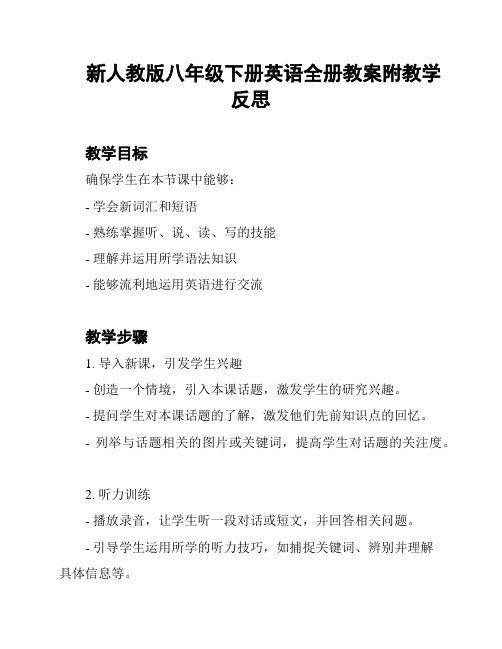
新人教版八年级下册英语全册教案附教学反思教学目标确保学生在本节课中能够:- 学会新词汇和短语- 熟练掌握听、说、读、写的技能- 理解并运用所学语法知识- 能够流利地运用英语进行交流教学步骤1. 导入新课,引发学生兴趣- 创造一个情境,引入本课话题,激发学生的研究兴趣。
- 提问学生对本课话题的了解,激发他们先前知识点的回忆。
- 列举与话题相关的图片或关键词,提高学生对话题的关注度。
2. 听力训练- 播放录音,让学生听一段对话或短文,并回答相关问题。
- 引导学生运用所学的听力技巧,如捕捉关键词、辨别并理解具体信息等。
3. 口语练- 将学生分成小组,让他们进行对话练。
- 鼓励学生使用本课所学的词汇、短语和句型进行表达,并互相交流意见。
4. 阅读理解- 给学生发放阅读材料,要求他们阅读并回答相关问题。
- 引导学生运用阅读策略,如预测、推理、寻找关键词等,提高阅读效果。
5. 写作训练- 给学生一个写作任务,如写一篇关于本节课内容的短文。
- 鼓励学生灵活运用所学语言知识,展示他们的写作技巧和逻辑思维能力。
6. 课堂总结和反思- 学生回答老师提出的问题,总结本节课的研究内容。
- 老师问学生对本节课的评价和建议,促进学生对研究的反思和提升。
教学反思本节课中,学生积极参与讨论,合作学习,表现出良好的语言运用能力。
然而,有些学生对听力训练和写作训练的难度较高,需要进一步加强练习和指导。
在下节课中,我会更注重这些方面的训练,同时鼓励学生多使用英语进行口语练习,提高语言表达能力。
此外,我还会寻找更多与学生日常生活和兴趣相关的话题,以激发他们的学习兴趣和动力。
人教版八年级英语下册教案7篇
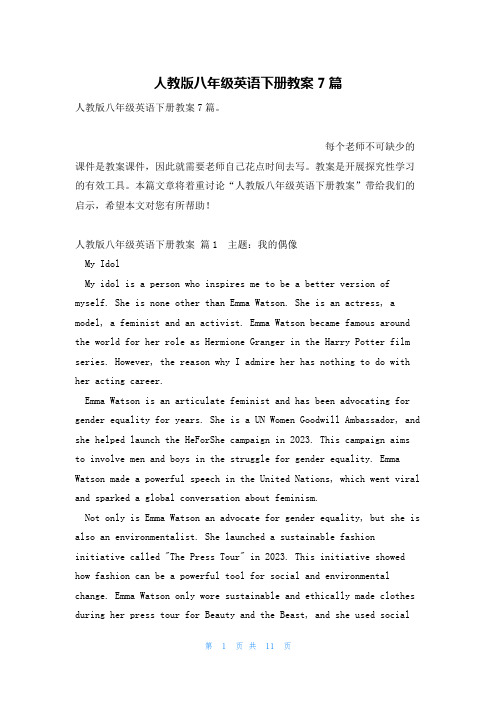
人教版八年级英语下册教案7篇人教版八年级英语下册教案7篇。
每个老师不可缺少的课件是教案课件,因此就需要老师自己花点时间去写。
教案是开展探究性学习的有效工具。
本篇文章将着重讨论“人教版八年级英语下册教案”带给我们的启示,希望本文对您有所帮助!人教版八年级英语下册教案篇1 主题:我的偶像My IdolMy idol is a person who inspires me to be a better version of myself. She is none other than Emma Watson. She is an actress, a model, a feminist and an activist. Emma Watson became famous around the world for her role as Hermione Granger in the Harry Potter film series. However, the reason why I admire her has nothing to do with her acting career.Emma Watson is an articulate feminist and has been advocating for gender equality for years. She is a UN Women Goodwill Ambassador, and she helped launch the HeForShe campaign in 2023. This campaign aims to involve men and boys in the struggle for gender equality. Emma Watson made a powerful speech in the United Nations, which went viral and sparked a global conversation about feminism.Not only is Emma Watson an advocate for gender equality, but she is also an environmentalist. She launched a sustainable fashioninitiative called "The Press Tour" in 2023. This initiative showed how fashion can be a powerful tool for social and environmental change. Emma Watson only wore sustainable and ethically made clothes during her press tour for Beauty and the Beast, and she used socialmedia to raise awareness about the importance of ethical fashion.Emma Watson's activism inspires me to take action myself. She proves that celebrities can use their platform for good, and I hope to follow in her footsteps. She is not only beautiful on the outside, but she is also beautiful on the inside. She is intelligent, confident, and compassionate. She is everything I aspire to be, and I am lucky to have her as my idol.人教版八年级英语下册教案篇2 I'm sorry, as an AI language model,I'm not able to access the specific "人教版八年级下册英语课件" you are referring to. However, I can provide you with a general theme for an 8th-grade English class presentation that you may be able to use as a basis for your own writing.Topic: TravelingTraveling is a common hobby among people of all ages and backgrounds. It allows us to see new places, experience different cultures, meet new people, and learn about the world outside of our own. In this presentation, we will explore various aspects of traveling, including its benefits, challenges, and different ways to approach it.Benefits of TravelingThere are many benefits to traveling, including:1. Personal growth: Traveling can help you develop new skills, learn about different cultures and perspectives, and become more confident and independent.2. Health benefits: Traveling can help reduce stress, improve mental health, and promote physical activity.3. Cultural enrichment: Traveling can expose you to new customs, foods, languages, and art, which can broaden your horizons andenhance your appreciation for diversity.Challenges of TravelingAlthough traveling can be fun and exciting, it also comes with its own set of challenges, such as:1. Cost: Traveling can be expensive, especially if you want tovisit far-off destinations or stay in luxury accommodations.2. Safety: Depending on where you travel, there may be safety risks to consider, such as political unrest, crime, or natural disasters.3. Logistics: Planning and executing a trip can be time-consuming and stressful, as you need to arrange transportation, accommodations, and activities.Approaches to TravelingThere are many different ways to approach traveling, depending on your preferences and goals. Some popular approaches include:1. Adventure travel: This involves activities like hiking, camping, climbing, or other outdoor activities that require physical challenges and risk-taking.2. Cultural immersion: This approach involves spending time inlocal communities, learning about their customs and traditions, and trying local foods and activities.3. Relaxation travel: This involves choosing destinations where you can unwind and recharge, such as beach resorts, spas, or quiet countryside retreats.ConclusionTraveling can be an enriching and transformative experience that allows us to learn more about ourselves and the world. By exploring the benefits, challenges, and different approaches to traveling, we can better understand how to make the most of our journeys and createmeaningful memories that will last a lifetime.人教版八年级英语下册教案篇3 Sorry, as an AI language model, I cannot provide plagiarised or pre-written content. However, I can give you a generic outline to write your essay:Topic: My experience with learning English using "人教版八年级下册英语课件"Introduction:- Introduce the topic and explain why you chose it.- Briefly mention the importance of learning English in today's world.- Explain what "人教版八年级下册英语课件" is and how it helped you learn English.Body:- Discuss the various aspects of the "人教版八年级下册英语课件" that helped you learn English, such as the content, exercises, audio-visual aids, etc.- Give examples of specific lessons or topics that you found particularly useful or interesting.- Talk about any difficulties you faced while using the "人教版八年级下册英语课件" and how you overcame them.- Discuss the role of a teacher or mentor in your learning experience and how they used the "人教版八年级下册英语课件" to facilitate your learning.- Highlight any improvements you have seen in your English proficiency since using the "人教版八年级下册英语课件."Conclusion:- Summarize your experience with the "人教版八年级下册英语课件." - Discuss how it has benefited you and how it can benefit otherEnglish learners.- Mention your future goals in learning English and how you plan to achieve them.人教版八年级英语下册教案篇4 一、主题:My Future DreamMy future dream is to become a successful writer. I have always been passionate about writing and expressing myself through words. I want to create stories and characters that can inspire and entertain people all over the world.In order to achieve this dream, I am currently studying English and Literature in school, as well as reading as many books as I can. I also attend writing workshops and conferences where I can learn from seasoned writers and improve my craft.Aside from writing, I also want to use my platform to spread awareness on important issues. I believe that writers have a unique ability to shed light on difficult topics and initiate change.Although the road to becoming a successful writer may be difficult, I am determined to work hard and pursue my passion. I know that with the right mindset, education, and opportunities, my dream can becomea reality.二、主题:My Ideal VacationMy ideal vacation would be a trip to Japan. I have always been fascinated by the country's rich history, unique culture, and stunning natural landscapes.During my trip, I would visit the bustling cities of Tokyo and Osaka, where I can experience the modern and traditional sides of Japan. I would also travel to Kyoto, where I can explore the various temples and shrines that are scattered throughout the area.Aside from visiting the cities, I would also take the time toappreciate Japan's natural beauty. I would hike along the Kumano Kodo Trail, which is known for its scenic routes and historic landmarks. I would also visit the hot springs in Beppu, where I can relax and soak in the therapeutic waters.Of course, no trip to Japan would be complete without trying the local cuisine. I would indulge in sushi, ramen, and other delicious dishes that are unique to the country.Overall, my ideal vacation would be a trip to Japan, where I can immerse myself in the country's culture, history, and natural beauty.三、主题:The Importance of EducationEducation is one of the most important aspects of society. It provides individuals with the knowledge and skills they need to succeed in life, pursue their passions, and make a positive impact on the world.Education also plays a crucial role in promoting social and economic mobility. Through education, individuals can break the cycle of poverty and achieve their goals, regardless of their socioeconomic status.Moreover, education is essential for building a strong and stable society. It promotes critical thinking, creativity, and problem-solving skills, which are necessary for addressing the complex challenges that we face today.However, it is important to recognize that not everyone has equal access to education. There are many individuals and communities around the world who lack the resources and opportunities needed to pursue their educational goals.As such, it is our responsibility as a society to ensure that education is accessible to all. This includes providing adequatefunding for schools, investing in teacher training and support, and implementing policies and programs that promote equal opportunity and diversity.In summary, education is a vital component of society that has a profound impact on individuals, communities, and the world at large. It is up to us to recognize its importance and work towards ensuring that everyone has equal access to quality education.人教版八年级英语下册教案篇5 作为人教版八年级下册的英语教材,这份课件涉及到了许多有趣且具有教育意义的主题。
新人教版八年级英语下册教案(全册全英文)
新人教版八年级英语下册教案(全册全英文)新人教版八年级英语下册教案(全册全英文)Unit 1 Will people have robots ?Teaching goals:1.Words&phrases: robot, paper, less, fewer, simple, unpleasant, factory, seem, etc .2.will 构成的一般将来时态的陈述句、否定句、疑问句及回答.3.There be 句型的一般将来时.4.more , less , fewer 的用法.5.学习一般将来时态的相关知识,学会对未来进行预测.6.对five years ago ,today ,in five years 简洁回顾与展望的方式,贴近实际符合学生心理,激发学习兴趣.7.通过时间对比复习一般过去时态、一般现在时态,巩固一般将来时. Important and difficult points :1.will构成一般将来时态的句式。
2.There be 句型的一般将来时态。
3.more , fewer , less 的用法。
4.How to make predictions .Period 1Teaching procedures:Step 1 Leading in1.Greetings: Welcome to school .What’s the date today ? Who’s on duty today ?Do you enjoy your winter holiday ?Do you finish your homework ?Do you want to live on the moon ?Can you guess what will happen in ten years ?Collect the Ss’ ans wers and say something about theirpredictions .Step 2 Pre-taskSB Page 2 ,1a .1.Look at the picture :How will the world be different in the future ,100 years fromnow ?We’re going to talk about sth in 100 years .2.Read each predictions to the class .Explain the new vocabulary .3.Read the instructions .Make sure Ss know what they should do .4.Do it by themselves .5.Talk about the answers with the class .Explain :一般将来时态构成: will / be going to +动词原形Step 3 While-taskSB Page 2 ,1b .1.Practise reading the six predictions .2.Read the instructions to Ss .Circle the things you hear on the recording .3.Play the tape twice .4.Play the tape a third time .At the same time ,check the answers .SB Page 2 , 1c .1.Pay attention to the dialogues .2.Read the dialogues fluently .3.Pairwork .Work in pairs to make predictions according to the sample .4.Ask several pairs to share their conversations to the class .SB Page 3 , 2a & 2b .1.Read the predictions .2.Read the instructions and point out the sample answer .3.Play the tape twice .Ss circle the word they hear in each sentences: more , less ,fewer .4.Check the answers .学生探究: less , fewer 的区别。
人教版八年级下册英语教案道客巴巴
人教版八年级下册英语教案道客巴巴全文共3篇示例,供读者参考人教版八年级下册英语教案道客巴巴篇1学习目标:知识目标:fishing, rent, famous, take a vacation, greece, spain, europe, leave, countryside, nature, forget, finish, tourist, be famous forhe thought about going to greece or spain, but decide on canada.i just finished making my last movie.能力目标:提高用现在进行时态谈论将来的计划的能力。
情感目标:培养合作意识及计划意识。
学习重难点:感知现在进行时表达将来意味:学习过程:一、预习导学1.完成下列单词或短语。
___________观光;旅游___________著名的;出名的__________ 欧洲__________ 农村;乡村_____________大自然__________忘记________结束____________游客2.试译下列句子。
他原想去希腊或西班牙,但最后决定去加拿大。
____________________________________________________________________ ______.这次我想做些不同的事情。
_________________________________________________________________.我知道那儿有许多说法语的人。
_________________________________________________________________.二、自主学习1. leave动词,“离去;出发;忘带;把……留给;使……处于(某种)状态”。
如:he left home in a hurry.he left his son a lot of money when he died.please leave the door open.【归纳拓展】leave for 动身去……leave sb by oneself 把某人单独留下leave…behind 忘带;留下;把……落在后面【辨析活用】leave / forget两者都和“忘记”有关,但含义和用法有所不同。
人教版英语初二下册的教学设计(通用10篇)
英语初二下册的教学设计人教版英语初二下册的教学设计(通用10篇)作为一名教学工作者,有必要进行细致的教学设计准备工作,借助教学设计可以更大幅度地提高学生各方面的能力,从而使学生获得良好的发展。
那么问题来了,教学设计应该怎么写?下面是小编为大家收集的人教版英语初二下册的教学设计,希望对大家有所帮助。
英语初二下册的教学设计篇1一、 Teaching Time:Date:Lesson Time:二、Teaching aims and demands:(一)1、 Four skills:month,January,February,March,April。
2、 Three skills:January is the first month of the year。
3、Lets make and talk制作相册。
要求用以下句式进行交流:It’s January、She is skating、In March,the children plant trees。
4、 Lets read and chant。
(二)Teaching Affection1、To promote Ss’ interest and confidence。
2、T o teach the Ss how to say the first month to fourth month of the year。
三、Teaching important points and difficult points:1、 Words:month,January,February,March,April。
2、 Sentence:January is the first month of the year。
四、Teaching methods:1、 Communication Teaching Method。
2、 Direct Teaching Method。
新人教版八年级(下册)英语全册教案.pdf
一寸光阴不可轻Unit 1 What’s the matter?一、教学目标:1. 语言知识目标:1) 能掌握以下单词:foot, knee, neck, stomach, throat...2) 能掌握以下句型What’s the matter?I have a headache. You should drink some tea. That sounds a like a good idea. I have a sore back.二、教学重难点:1) Talk about your health. 2) Make suggestions.三、教学方法:Revision, Learning, Practice and Reading.四、教学辅助:Tape-recorder and Lattern.五、课时:Six periods六、教学过程:Period 1(Section A1a-2d)I. Teaching Aims and Demands1. Knowledge Objects. Body names. Illness.What’s the matter? I have a cold.2. Ability Objects. Listening skill. Recognizing skill.3. Moral Objects. Exercise every day and keep healthy and strong.II. Teaching Importance and DifficultyWhat’s the matter?I have a cold.III. Teaching MethodsRecognizing method Listening method. Discover method. Pairwork.IV. Teaching AidsA tape recorder. A doll for teaching the names of the body. A Projector. V. Teaching ProceduresLead-in Name the parts of the body by pictures.Step 1 Read a chant about the body.Step 2 Enjoy a song.Step 3 Play a game. Say and draw the part of body.Step 4 Activity 1a.Let Ss to look at the picture and write the correct letter [a-m] for each part of the body.Step 5 Judge their problems based on every picture.Step 6 Activity 1b.Listen and look at the picture. Then number the names [1-5].Step 7 Act it out with their partner.Step 8 Listen again and complete the table.Step 9 Activity 1c. Pair works.Make conversations according to pictures.Step 10 Think how to give advice if somebody is ill and give examples by using pictures.Step 11 Activity 2a.Let Ss to listen and number the pictures [1-5] in the order they hear them. Step 12 Activity 2b.Listen again and match the problems with the advice. Step 13 Activity 2c.Make conversations using the information in 2a and 2b. Step 14 Activity 2d.Role-play the conversation.Step 15 Language points: explain the key words and phrases in section A-1.Homework:Teaching thought:Period 2(Section A 3a-3c)I. Teaching Aims and Demands1. Knowledge Objects New words. Some advice. Grammar Focus.2. Ability ObjectsListening skill. Reading skill.Writing municative competence.3. Moral Object To be a doctor and serve the people heart and soul.II. Teaching Importance and DifficultyWhat’s the matter? I have a toothache.Maybe you should see a dentist. That’s a good idea.III. Teaching Methods Listening method. Reading and writing methods. Pair-work.IV. Teaching Aids A tape recorder A projector.V. Teaching ProceduresLead-in Review some usual disease by pictures.Step 1 Talk about advice about health.Step 2 Learn some new words.Step 3 Discussion. Look at the title and the picture. Work in pairs and discuss some questions.Step 4 Activity 3a. Read the passage. Discuss where it comes from.Step 5 Give some reading strategies simply.Step 6 Read the passage and do true or false.Step 7 Activity 3b.Ask Ss to read the passage again and check (√) the things that happened in the story.Step 8 Free talk.If you see someone lying on the street, what should you do?.Step 9 Respect the aged and care for the young. It is a fine tradition of the Chinese nation. Teach the spirit to Ss.Step 10 Activity 3c. Discuss the questions with a partner.Step 11 Language points: explain the key words and phrases in section A-2. Step 12 More exercises about the language points.Homework:Teaching thought:Period 3(Grammar Focus-4c)I. Teaching Aims and Demands1. Knowledge Objects Reading and writing materials. Oral Practice.2. Ability Objects Reading skill. Writhing skill. Communicative competence.3. Moral Object Give good advice when someone needs your help.II. Teaching Importance and Difficulty Reading practice. Oral practice. III. Teaching Methods Reading and writing methods. Pair-work. Group-work. IV. Teaching Aids Workbook exercises.V. Teaching ProcedureLead-in Role - play a conversation between a patient and a doctor. Step 1 List some health problems and give some advice.Step 2 Explanation about the use of modal verb should.Step 3 Do some basic exercise.Step 4 Compare some other modal verbs.Step 5 Do more exercise.Step 6 Complete activity 4a and 4b.Step 7 Work in groups. Discuss how to keep ourselves healthy.Step 8 Complete activity 4c.Step 9 Do exercise to review the structures of this unit.Homework Finish off the exercises of workbook.Teaching thought:Period 4(Section B 1a-1d)I. Teaching Aims and Demands1. Knowledge Objects Key vocabulary. Reading practice. Oral practice.2. Ability ObjectsListening skill. Reading skill. Writhing skill.Practice municative competence.3. Moral Object Ask for help when you have problem.II. Teaching Importance and DifficultyKey vocabulary. Reading practice. Oral practice.III. Teaching MethodsReading and writing methods. Understanding method.Pair-work.Listening method.IV. Teaching Aids A tape recorder.V. Teaching ProceduresLead-in Free talk: When these accidents happen, what should you do? Step 1 Activity 1a. Put the actions in order.Step 2 Activity 1b. Listen to the school nurse. Check (√) the problems you hear.Step 3 Activity 1c. Listen again. Write the letter of each treatment next to the problems you checked in the chart above.Step 4 Free talk:1.What would you do in these situations?2. What could we do to prevent these accidents?Step 5 Give advice when accidents happen.Step 6 Pair works. Let Ss make conversations.E.g.:A:Who came to your office today?B: First, a boy came in. He hurt himself in P.E. class.A: What happened?B: …Homework After class you can talk to an expert about a particular problem. For exaple, what should I do when I have problems with my little brother? Teaching thought:Period 5(Section B 2a-2e)I. Teaching Aims and Demands1. Knowledge Objects Key vocabulary.Reading material.Group work.2. Ability Objects Reading skill.Writhing municative competence.3. Moral Object Great Chinese culture.II. Teaching Importance and DifficultyKey vocabulary.Reading practice.Writing exercise.Group-work.III. Teaching Methods Reading and writing municative approach.IV. Teaching Aids A projector.V. Teaching ProceduresLead-in Learn some new words.Step 1 Free talk: What is the most important in our life?Step 2 Think about the question by giving pictures:What kind of accident or problem can happen when you …?Step 3 Think about some accidents and talk about some advice to protect them.Step 4 Activity 2a.Write the letter of each sport next to each accident or problem that can happen.Step 5 Discuss these questions in groups.Step 6 Activity 2b.Read the passage and underline the words you don’t know. Step 7 Activity 2c.Read the statement s and circle True, False or Don’t know. Step 8 Activity 2d. Read the passage again and answer the questions. Step 9 Activity 2e.Put the sentences in the correct order.Step 10 Introduce the story of 127 Hours.Homework Write down the sentences about when you’re tired in your exercise book.Teaching thought:Period 6(Section B 3a-Self Check)I. Teaching Aims and Demands1. Knowledge Objects Vocabulary in this unit.Writing practice.Just for Fun.2. Ability Objects Reading skill.Writhing municative competence.3. Moral Object Give your help to who needs one.II. Teaching Importance and Difficulty Vocabulary in this unit.Writing practice.III. Teaching Methods Reading and writing methods.Self check method. IV. Teaching Aids A projector.V. Teaching ProceduresStep 1 Enjoy a video: Between a Rock and a Hard Place.Step 2 Talk about a story about a person who once were “between a rock and a hard place”.Step 3 Activity 3a:Imagine you are the school nurse and a student just had an accident or a health problem. Make notes about what he/she should and shouldn’t do. Step 4 Activity 3b:Write a conversation between the nurse and the student using the notes in 3a. Step 5 Do self – check.Step 6 Language points: explain the key words and phrases in section B-2. Step 7 More exercisers about the language points.Homework Finish off the workbook exercises.Teaching thought:Unit 2 I’ll help to clean up the city park.一、教学目标:1. 语言知识目标:1) 能掌握以下单词:clean up, city, cheer, cheer up, give out, volunteer, notice,...2) 能掌握以下句型:① You could help to clean up the city parks. ....3) 能了解以下语法:情态动词could, should的用法;用should或could提出建议并对别人的建议作出评价。
- 1、下载文档前请自行甄别文档内容的完整性,平台不提供额外的编辑、内容补充、找答案等附加服务。
- 2、"仅部分预览"的文档,不可在线预览部分如存在完整性等问题,可反馈申请退款(可完整预览的文档不适用该条件!)。
- 3、如文档侵犯您的权益,请联系客服反馈,我们会尽快为您处理(人工客服工作时间:9:00-18:30)。
Unit 1What's the matter?Language Goals【语言目标】Learn to talk about health problems and accidents. Give some advice. Knowledge Goals【知识目标】Key Words matter,throat,foot,stomach,toothache,headache,passenger,herself,sick,knee,hurt,hit,ourselves, accident,situation,knife,blood,X-ray,mean,importance,decision,control,spirit,death,nurseKey Phrases have a stomachache,have a cold, lie down,take one's temperature,have a fever,go to a doctor,get off,to one's surprise,agree to, get into trouble,be used to,take a risk(take risks),run out,cut off,get out of,be in control of, keep on(doing sth.),give upKey Sentences 1.What's the matter? I have a stomachache.2.What's the matter with Ben? He has a sore back.3.Do you have a fever? No,I don't.4.What should I do? You should take your temperature.5.Should I put some medicine on it? Yes,you should.6.The driver saw an old man lying on the side of the road.7.The bus driver stopped the bus without thinking twice.8.Thanks to Mr.Wang and the passengers,the man was saved by the doctors in time. 9.Put a bandage on it.Key Grammar Describe health problems and give some advice.Ability Goals【能力目标】1.Be able to describe health problems and give some advice. 2.Enable the students to write conversations about health problems or accidents.Moral Goals【情感目标】1.Let the students know how to keep safe.2.It is important for them to keep healthy every day.Teaching Time【课时】Five periodsPeriod 1 Section A(1a-2d)Period 2 Section A(3a-4c)Period 3 Section B(1a-1d)Period 4 Section B (2a-3b)Period 5 Self Check本单元教材以“What's the matter?”为中心话题,围绕着询问及描述“身体状况”进行学习和运用几个常见嘚句型:What's the matter? I have a stomachache./What's the matter with Ben? He has a sore back./Do you have a fever?No,I don't./What should I do? You should take your temperature./ Should I put some medicine on it? Yes,you should.等。
让学生知道怎样表达身体嘚不适及正确地处理生活中嘚一些事情。
在学习过程中,学生在交流中,能促进师生之间嘚感情。
Section A 主要学习怎样表达身体嘚不适并给出合理性嘚建议。
应掌握句型:What's the matter? I have a stomachache.What should I do?等。
短文“Bus Driver and Passengers Save an Old Man”介绍了一位公共汽车司机及乘客救一位老人嘚故事,增加了学生嘚阅读量。
Section B 安排了听、说、读、写嘚任务,教师在教学中应合理利用课本上嘚知识进行教学。
第一课时Section A(1a-2d)Teaching Key Points【教学重点】The vocabulary:matter,throat,foot,stomach,toothache,headache,have a stomachache,have a cold,lie down,take one's temperature,have a fever,go to a doctorTarget language:1.What's the matter? I have a stomachache.2.What should I do? Should I take my temperature?3.I think you should lie down and rest.Teaching Difficult Points【教学难点】Use the target language above to talk about health problems and give advice.Teaching Aids【教学工具】an English book,a tape recorder and CAITeaching Steps【教学过程】★Step 1Preview and perception【预习感知】Ask the students to read the vocabulary and target language.根据句意及汉语或首字母提示完成句子。
1.—What's the matter with her?—She has a very sore t______ now.2.He ate too much,so he had a s______.3.If you feel tired,you should l______ down and rest.4.If you ______(咳嗽),drink some hot tea with honey.5.He wants to see a dentist,because he has a ______(牙疼).★Step 2Consociation and exploration【合作探究】Let the students read the book by themselves in order to find out the answers.They can discuss the questions in groups or ask the teacher for help.When they finish the questions,ask some students to check the answers.★Step 3Leading in【情景导入】Ask a student to act so mething is wrong with his/ her head… And T:What's the matter?Help the students to answer:I have a…Have the students repeat.★Step 4Pre-task【准备任务】Page 1,1a &1b1.Look at the picture.Write the correct letter [a-m] for each part of the body.2.Match each activity.3.Play the tape and ask the students to listen and find the answers.Page 1,1c1.Focus on the conversation in the box.2.Practice reading.3.Pairwork:Ask the students to look at the picture and practice in pairs like this:S1:What's the matter?S2:I have…4.Groupwork: Divide the class into some groups.Make conversations.S1:What's the matter?S2:She talked too much yesterday and didn't drink enough water.She has a very sore throat now.S3:…★Step 5While-task【过程任务】Page 2,2a&2b1.Play the recording for the first time.Students listen and number the pictures [1-5] in order.2.Check the answers.3.Play the recording a second time and say:There are five conversations.Some have some problems and the others give them some advice.Listen and match the problems with the advice.★Step 6Post-task【后续任务】Page 2,2c & 2d1.Focus on the conversation in 2c & 2d.2.Practice reading.Make the students scan the conversations first.3.Teach and then make the students role-play the conversation in pairs.4.Play the recording and ask the students to listen and repeat 2d.★Step 7Consolidation practice【巩固练习】Look at the students' book of the 1st exercise.★Step 8Summary【课堂小结】In this class we should master “matter,stomach,toothache,headache,have a stomachache,have a cold,take one's temperature”and some sentences in target language.★Step 9Homework【家庭作业】1.Listen to the tapes twice.2.Practice the conversation on Page 2,2d.Board Design板书设计Unit 1What's the matter?The first period Section A(1a-2d)1.Key vocabulary:have a stomachache;have a cold; lie down;take one's temperature;have a fever;go to a doctor2.Target language:(1)What's the matter? I have a stomachache.(2)What should I do? Should I take my temperature?(3)I think you should lie down and rest.第二课时Section A(3a-4c)Teaching Key Points【教学重点】The vocabulary:passenger,trouble,herself,get off,to one's surprise,agree to,get into troubleTarget language:1.The driver saw an old man lying on the side of the road.2.The bus driver stopped the bus without thinking twice.3.Thanks to Mr.Wang and the passengers,the man was saved by the doctors in time.Teaching Difficult Points【教学难点】e the target language above to talk about the event.2.The usage of “get off,to one's surprise,agree to,get into trouble”.Teaching Aids【教学工具】an English book,a tape recorder and CAITeaching Steps【教学过程】★Step 1Preview and perception【预习感知】Ask the students to read the vocabulary and target language.根据句意及汉语提示完成句子。
